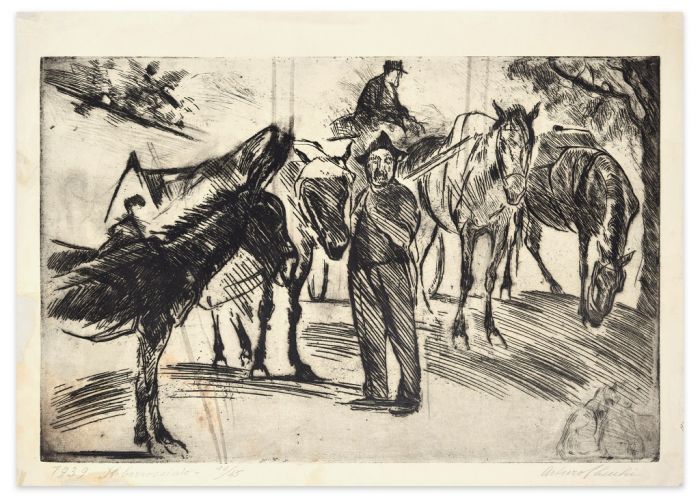Utilizziamo i cookie per rendere migliore la tua esperienza di navigazione. Per rispettare la nuova direttiva sulla privacy, è necessario chiedere il tuo consenso per impostare i cookie. Per saperne di più.
Il Barrocciaio
Il barrocciaio is a superb etching, drypoint and burin on an ivory-colored laid paper, realized in 1939 by the Italian artist Arturo Checchi (1886-1971).
Signed in pencil on the lower right margin, and dated , titled and numbered in Arabic numerals and in pencil on the lower left margin.
From a very rare edition of 45 pieces .
Representing a genre scene of ordinary life in Fucecchio, the Tuscan town well-known for the leather processing, this modern artwork has extraordinary beauty in the incisive, rapid line and in its deep blacks. Moreover, the eye falls in the rethinking of the profile of the cat on the lower right corner.
In very good conditions, except for some minor signs of the time like the usual yellowing of the paper at the edges and some light abrasions of the paper on the margins. This defect does not affect the image, which has preserved the freshness of the sign, and the lifetime impressions in addition to a superb inking.
Il barrocciaio is a superb etching, drypoint and burin on an ivory-colored laid paper, realized in 1939 by the Italian artist Arturo Checchi (1886-1971).
Signed in pencil on the lower right margin, and dated , titled and numbered in Arabic numerals and in pencil on the lower left margin.
From a very rare edition of 45 pieces .
Representing a genre scene of ordinary life in Fucecchio, the Tuscan town well-known for the leather processing, this modern artwork has extraordinary beauty in the incisive, rapid line and in its deep blacks. Moreover, t he eye falls in the rethinking of the profile of the cat on the lower right corner.
In very good conditions, except for some minor signs of the time like the usual yellowing of the paper at the edges and some light abrasions of the paper on the margins. This defect does not affect the image, which has preserved the freshness of the sign, and the lifetime impressions in addition to a superb inking.
Exhibited at the Second International Biennial of Graphic Works at Palazzo Strozzi, Florence, in 1970, n. 5, p. 114.
Arturo Checchi (Fucecchio, 1886 - Perugia, 1971)
The Italian painter started drawing with a private teacher when he was 12 and in 1902 he has attended the Academy of Fine Arts in Florence for three years under the guidance of Alfonso De Carolis. Once the Academy was finished, he began his activity as a decorator and continued his studies in drawing until the outbreak of World War I, which forced him to return to Fucecchio. After his first artistic training, he traveled to Germany, where he met the Jugend painters and the expressionists. He taught at the Academies of Perugia (from 1925, and where he married one of his students, Zena Fettucciari), of Brera (from 1939) and Florence (from 1942 to 1961).
Adhering to the Tuscan pictorial taste of the time, Checchi was among the first painters to orient himself to the style of Cézanne, which Vittorio Pica introduced in Italy in 1908 with the publication The French Impressionists : " influenced by the admirable capacity for synthesis and the will of the French to create abstract harmonies of masses and tones ". His palette was also enriched by a coloristic incisiveness drawn from Van Gogh and Gauguin.
Since 1975, two sculptures have been exhibited in Vallombrosa: La sirena (1932) and Bimba al sole (1935). Il violino (gardens of piazza Italia) and La chitarra (foyer of the Teatro Morlacchi) are exhibited in Perugia. He held several personal exhibitions in Florence; he participated in the Venice Biennial (in 1926, 1928, 1932, 1934, 1936 and 1940), in the first eight editions of the Rome Quadrennial and in graphic collective exhibitions in Florence, New York, Paris, Warsaw, Riga. He was also present at the Exhibition International Art Fair in Barcelona, launched in 1931 by the National Fascist Union. Also known as etcher and draftsman, he took part in the International Exhibition of Graphics at Palazzo Strozzi in 1968-69 and published the following images: 33 original lithographs, Fucecchio of that time, 44 etchings and juvenile woodcuts, as well as other engravings.
| SKU | J-45201 |
|---|---|
| Artista | Arturo Checchi |
| Typology | Original Prints |
| Technique | Drypoint |
| Periodo | 1930s |
| Conditions | Good (minor cosmetic wear) |
| Dimensioni (cm) | 35.7 x 0.1 x 50.7 |



Validate your login